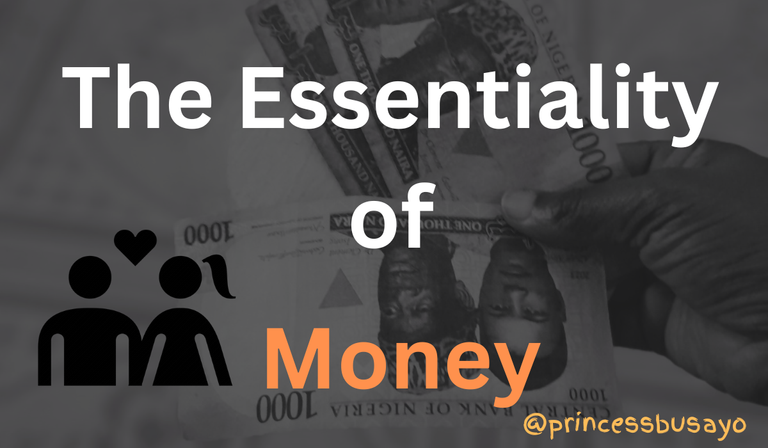As we have been taught in schools, money is a universally accepted medium of exchange, typically in the form of coins, banknotes, or digital representations that are used to transact goods, services or debts. The three main functions of money are;
- To store value
- A medium of exchange and
- A unit of account.

Money is also the lifeblood of modern society that holds a great role in shaping our lives. Without money, our needs aren't met and to live a comfortable life, money is needed to make life easier. Money dictates our path and helps us seize various opportunities. The necessity of money goes beyond mere material possessions; it intertwines with our basic needs, societal functions and personal aspirations. As we try to understand its indispensable essence, it reveals to us the great impact it brings to our existence.
From its foundation, money fulfils the fundamental human needs for sustenance, security and shelter. The provision of basic necessities lies across the availability of financial resources which enable each individual to acquire food, shelter, healthcare and education. The absence of money or its scarcity often deprives humans of many rights, limiting their potential and perpetuating societal disparities. So also, the fear of scarcity of money and the desire for a better quality of life motivates individuals to continuously seek financial stability.

However, beyond survival, money unlocks doors of opportunities for personal growth and advancement. It serves as a tool for exploration, education, skill development etc. It is the availability of money that makes individuals pursue more knowledge, enrichment and self-improvement. Scholarships, courses, skills and learning opportunities become obtainable through the financial leverage money provides, thereby empowering individuals to develop their horizons and become important persons in society while contributing to meaningful discussions.
In addition, the aspirations and goals of individuals are what drive them in the pursuit of money relentlessly. For some, money represents freedom which enables them to seek pleasures, travel for exploration, support loved ones etc.
Looking at it in a broader context, money lubricates the wheels of economies which drive innovation, progress and connections. Money helps to facilitate trade, investment and entrepreneurship, promoting economic development and prosperity. This is what makes societies thrive when there are individuals who transact with businesses, share ideas, invest and amplify opportunities for collective advancement. Cultural norms, societal expectations and peer pressure often see wealth as a symbol of success and status and it is what perpetuates individuals to keep pursuing money in order to be recognised, have respect and have a sense of accomplishment.
However, the essential value of money extends beyond tangible wealth; its influence penetrates through human relationships and societal structures. It influences power dynamics and shapes hierarchies and the ability to make informed decisions making. The distribution and accessibility of wealth greatly impact social mobility and equity which raises some pertinent questions about fairness within societies.
In conclusion, the need for money transcends beyond mere transactions; it represents the essence of survival, progress and societal functioning. Its drawback is that it brings about the endless circle of wanting more, which may increase tension, and anxiety and ignore other facets of life which include relationships, one's well-being and experiences that aren't motivated by money. Although we cannot dispute its importance, understanding its multifaceted effects encourages reflection on the part of individuals and societal relationships. To strike a healthy and balanced coexistence, it is important to acknowledge its significance while navigating the moral and ethical challenges it comes with.
First image background is mine. Both a designed on Canva
Thanks for your time reading. Looking forward to your interaction.

Posted Using InLeo Alpha